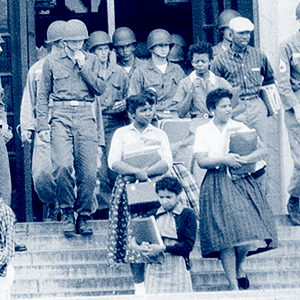
 EVERAL WEEKS AGO, I wrote about Rach 3, but today’s article is not Rach 9 — it’s “Little Rock Nine.” Have you heard this fascinating story? I’ll give you the short version. If I make any major mistakes, please use the combox to correct me.
EVERAL WEEKS AGO, I wrote about Rach 3, but today’s article is not Rach 9 — it’s “Little Rock Nine.” Have you heard this fascinating story? I’ll give you the short version. If I make any major mistakes, please use the combox to correct me.
Basically, what happened was, in 1957, Governor Orval Faubus tried to use the Arkansas National Guard to keep African American students from attending Little Rock Central High School. However, President Eisenhower sent in troops from the 101st Airborne Division of the United States Army to escort the students into the school.
For the entire year, those nine African American students were protected each day by federal troops. Faubus got so angry, he shut down the entire school district in 1958 for a whole year! Everyone ought to learn the details about this story. If anyone knows a historically accurate online video, please recommend it in the combox. I’d like to know what ever happened to those children.
Can you imagine having to go through such an ordeal as a kid? I would have been terrified. Besides, were the federal agents willing to protect each student’s home?

AS CHURCH MUSICIANS, we suffer a great deal. The deck seems to be “stacked” against us. Maybe you work hard to start something good, but your priest is transferred. Maybe you struggle to find talented singers in your parish. Perhaps your priest has treated you unjustly. The list goes on.
Sometimes, it helps to remember the tremendous suffering of others, such as the horrific plight of Christians in Eritrea. Our crosses are nothing compared to theirs. If we trust in God, He will give us the strength to continue.
I find the “Little Rock Nine” to be inspiring, and I’m glad it had a happy ending. On the other hand, we still have a lot of work to do in this country. Since 1973, we have “legally” murdered more than 50 million innocent children, and those are just the ones we know about.
